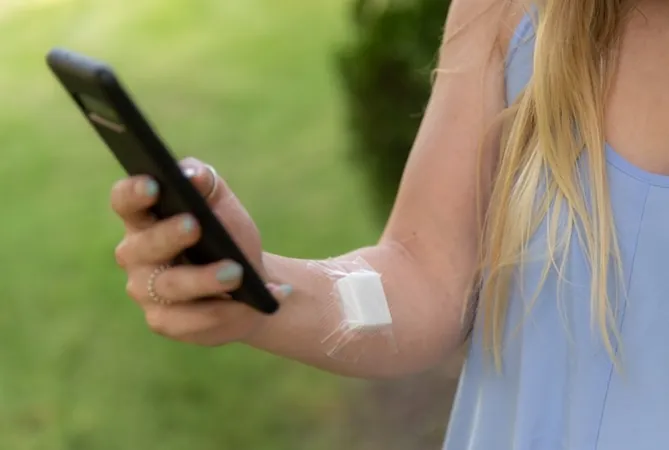
Revolutionary Sweat Sensors Set to Transform Liver Disease Monitoring!
2025-01-23
Author: Daniel
Revolutionary Sweat Sensors Set to Transform Liver Disease Monitoring!
In an exciting breakthrough, researchers from Virginia Commonwealth University and the Richmond VA Medical Center are harnessing the power of wearable technology to address one of the world’s leading health challenges: liver disease. A new study reveals how noninvasive sweat sensors could be vital in tracking the progression of liver disease, offering hope for better outcomes for millions of patients.
Imagine wearing a device on your forearm that continuously gauges your health without the discomfort of needles. Over the span of three days, 32 patients suffering from cirrhosis and 12 healthy participants donned the innovative Sweat AWARE sensor. This remarkable gadget can detect three compounds associated with liver inflammation, serving as an alert mechanism for the often silent progression of liver scarring.
The study, featured in the esteemed journal *Nature Digital Medicine*, showcases the potential of sweat-based monitoring to yield critical insights into liver health, quality of life, and patient outcomes. The risk of liver disease cannot be overstated—it is responsible for approximately 2 million deaths annually worldwide, often as a result of chronic inflammation induced by obesity, excessive alcohol consumption, and viral infections.
For patients, the traditional monitoring approach involves painful and invasive blood tests that only provide intermittent snapshots of health status. This new technique stands to revolutionize that model, offering continuous insights that could lead to earlier intervention and treatment.
Lead author Dr. Brian Davis emphasized, “Chronic inflammation can often manifest without symptoms until it reaches critical stages. Our findings show that we can measure inflammation in the sweat of patients with advanced liver disease, paving the way for future studies on ‘sweat signatures’ for earlier diagnosis of potentially life-threatening infections.”
The findings are particularly promising, showing a remarkable correlation between the biomarkers in sweat and blood serum. The sensor revealed distinct patterns, such as peaks in inflammatory levels in the early evening, offering a detailed timeline of physiological changes.
Dr. Jasmohan Bajaj, the study's corresponding author, believes these advancements could drastically enhance patient care. “Noninvasive monitoring will allow us to better manage complications of cirrhosis and prevent dire outcomes. This technology grants clinicians much-needed clarity regarding disease activity, enabling timely interventions.”
The implications of this research extend beyond liver disease. Specialists are actively searching for non-invasive testing methodologies across various medical fields to reduce the need for frequent blood draws and biopsies. Although many companies are developing similar technologies, FDA approval remains a hurdle yet to be cleared.
Furthermore, the study has significant implications for managing cirrhosis as it progresses. Patients often transition from asymptomatic stages to experiencing debilitating symptoms like infections, cognitive decline, and bleeding, all of which can lead to hospitalizations.
What's more, the research suggests that sweat profiling could herald a new era for defining health—patients experiencing infections showed markedly elevated levels of biomarkers in their sweat, indicating that proactive monitoring could ensure earlier identification of infections, resulting in timely treatments.
Dr. Bajaj cautions that while these findings are promising, this preliminary study was small in scale. He advocates for larger, long-term research efforts to confirm these compelling results and explore their implications for treating other chronic inflammatory conditions.
In addition to the VCU team, collaboration with researchers from the University of Dallas and the sensor manufacturer EnLisense emphasizes a collective effort to innovate health monitoring technologies.
Stay tuned as sweat sensors may just be the game-changer in how we manage liver disease and beyond!



 Brasil (PT)
Brasil (PT)
 Canada (EN)
Canada (EN)
 Chile (ES)
Chile (ES)
 Česko (CS)
Česko (CS)
 대한민국 (KO)
대한민국 (KO)
 España (ES)
España (ES)
 France (FR)
France (FR)
 Hong Kong (EN)
Hong Kong (EN)
 Italia (IT)
Italia (IT)
 日本 (JA)
日本 (JA)
 Magyarország (HU)
Magyarország (HU)
 Norge (NO)
Norge (NO)
 Polska (PL)
Polska (PL)
 Schweiz (DE)
Schweiz (DE)
 Singapore (EN)
Singapore (EN)
 Sverige (SV)
Sverige (SV)
 Suomi (FI)
Suomi (FI)
 Türkiye (TR)
Türkiye (TR)
 الإمارات العربية المتحدة (AR)
الإمارات العربية المتحدة (AR)